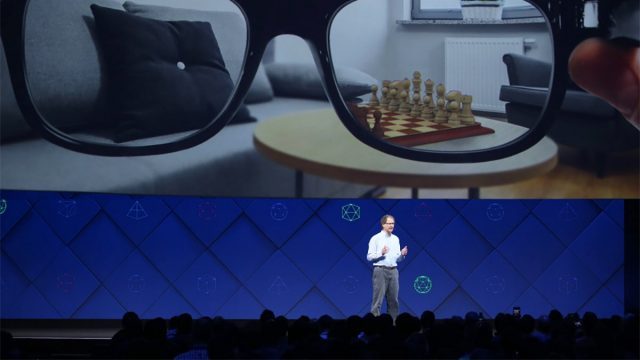Michael Abrash, Chief Scientist at Oculus, as-ever delivered an inspiring presentation at today’s F8 conference, this time on the topic of Augmented Reality. AR has received top billing at this year’s event, with Facebook introducing a camera-based platform to develop today’s technology; Abrash’s talk looked further ahead to glasses-based AR which he says will transform how we work and play.
Opening the Facebook F8 event yesterday, founder and CEO Mark Zuckerberg briefly mentioned an exciting future of wearable AR hardware before moving his focus to the near-term with the smartphone and camera. Today, Michael Abrash’s talk was a deeper look at AR glasses, a product he believes is “on the way, and when they arrive, they’ll be one of the great transformational technologies of the next 50 years.” You can watch his presentation in full in the video below, starting at 57:45.
Abrash thinks the “new wave of virtual computing,”—which he defines as encompassing VR and AR—could even surpass the impact of the personal computing revolution of the last 50 years. Imagining a world 20 or 30 years from now, he predicts we will wear stylish glasses all day, offering “VR, AR, and everything in between”, with real and virtual worlds seamlessly mixing throughout our daily lives.
Looking to a nearer future, where VR and AR are still treading distinct hardware paths, Abrash notes that “always-on, go-everywhere mixed reality” won’t be a VR headset’s strong suit, due to the problem of social acceptability; see-through AR glasses is the sensible route towards acceptable integration of virtual computing.
The concept of “Full AR” was introduced, which Abrash defines as “glasses that enhance your hearing and vision seamlessly, make you smarter and more capable, and that are light, comfortable, stylish, power efficient, and socially acceptable enough to be a constant part of your life”. The hardware would be “your always-on helper, continually aware of your surroundings, your context and your history, constantly mixing the real and virtual worlds to serve your needs and keep you connected”.
“Oculus Research is hard at work on AR, and we’re far from the only ones”, says Abrash, but notes that many of the necessary enabling technologies do not currently exist. He outlined the broad challenges facing R&D labs in the foreseeable future: ‘Full AR’ requires major advancements in optics and displays, audio, interaction, computer vision, AI, system design, UX, material science, perceptual science, and graphics. Noting the importance of an interaction revolution, Abrash suggested the ultimate solution would be a “direct brain interface,” a promising area of research, as highlighted in the talk that followed.
“Despite all the attention focused on AR today, it will be 5 years at best before we’re really at the start of the ramp to widespread glasses-based augmented reality, before AR has its ‘Macintosh moment’,” Abrash said.


